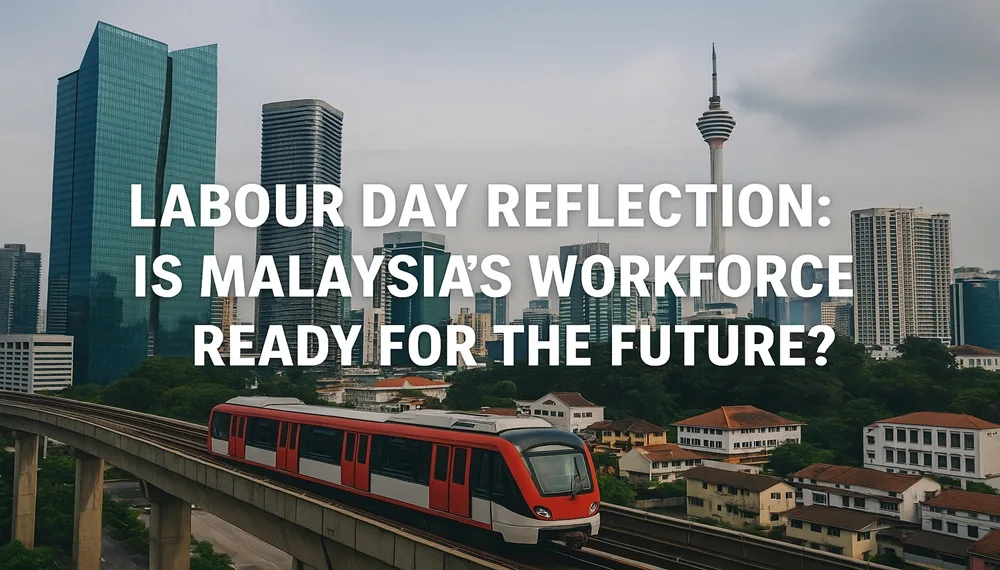
Labour Day Reflection: Is Malaysia’s Workforce Ready for the Future?
By Norazam Nordin
KUALA LUMPUR, May 1 – As the nation celebrates Labour Day, it is not only a time to honour the contributions of workers across every sector but also to reflect on the future of Malaysia’s workforce. With rapid technological disruption, shifting global labour dynamics, and new economic realities, the question emerges: Is Malaysia truly ready for the future of work?
The Future of Work in Malaysia
Malaysia, like much of the world, is navigating a profound transformation in the job market. Automation, artificial intelligence (AI), digital platforms, and green technologies are reshaping industries at an unprecedented pace. The World Economic Forum estimates that by 2025, more than 40% of the core skills required for most jobs will change. In Malaysia, industries such as manufacturing, retail, finance, and even agriculture are already undergoing this transition.
The government’s Twelfth Malaysia Plan (12MP) and policies like MyDigital aim to future-proof the economy by pushing for digital adoption and higher productivity. But these aspirations can only be realised if the workforce is equipped with future-ready skills.
Are Malaysians Ready to Work Abroad?
One potential solution to Malaysia’s saturated job market and underemployment issue is encouraging skilled Malaysians to explore work opportunities abroad. Malaysia’s diaspora—over 1 million living and working overseas—has shown that Malaysian professionals are highly regarded in sectors such as healthcare, engineering, oil & gas, IT, and education.
But there are challenges. Language barriers, cultural adaptation, and lack of international exposure remain obstacles for many. However, younger Malaysians, especially Gen Z and millennials, are increasingly global-minded and open to remote work or relocating if it means better pay and career growth.
Government-to-government (G2G) partnerships, such as those explored with Japan, Korea, and the Middle East, can help formalise pathways for Malaysians to work overseas safely and competitively.
Jobs at Risk: What Roles Will Disappear?
With automation and AI adoption, some job roles are at high risk of becoming obsolete. These include:
• Clerical and administrative roles: Tasks like data entry, basic accounting, and record keeping can now be done more efficiently by machines.
• Assembly line manufacturing: Robotics and smart manufacturing systems reduce the need for manual repetitive labour.
• Telemarketing and basic customer service: AI-powered chatbots and call systems can now handle basic inquiries and sales outreach.
• Cashiers and retail clerks: With self-checkout kiosks and e-commerce platforms, traditional retail roles are declining.
While these jobs may disappear, new ones are emerging—data analysts, cybersecurity specialists, drone operators, sustainability consultants, and AI trainers, to name a few.
Why Malaysia Needs a National Reskilling Movement
The shift in workforce demands is not just about replacing jobs, but upgrading people. A nationwide reskilling and upskilling movement is crucial to prevent Malaysians from being left behind.
Many mid-career workers are at risk of redundancy if they don’t adapt. Yet reskilling is not just for the unemployed; it is for everyone. From the kampung small trader to the urban executive, lifelong learning must become a cultural norm.
Initiatives such as HRD Corp’s reskilling programmes, TVET (Technical and Vocational Education and Training) reforms, and collaborations with tech companies for digital training are steps in the right direction. However, more needs to be done—especially in rural areas and among low-income groups.
The Role of Employers and Policymakers
Employers must rethink hiring and training strategies. It’s no longer enough to demand experience; companies must be willing to invest in their people’s growth. Apprenticeship models, flexible work arrangements, and employee-funded upskilling allowances should become mainstream.
Meanwhile, policymakers need to anticipate future disruptions—not merely react to them. Labour laws must evolve to cover gig workers, remote employees, and freelance creatives who now form a large chunk of the workforce.
Labour Day with a Vision
Labour Day 2025 is not just a celebration of past achievements but a moment to shape a forward-looking vision. Malaysia’s strength lies in its young, diverse, and adaptable population. With the right investments in skills, mindset, and mobility, Malaysians can not only thrive locally—but become global citizens of the future workforce.
The future of work is not something to fear. It is something to build—together.
-Kuala Lumpur

